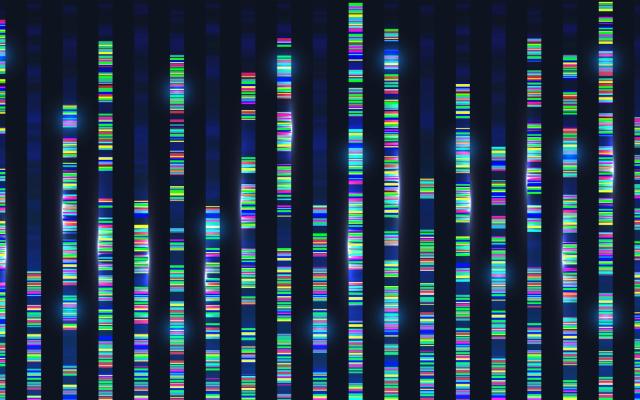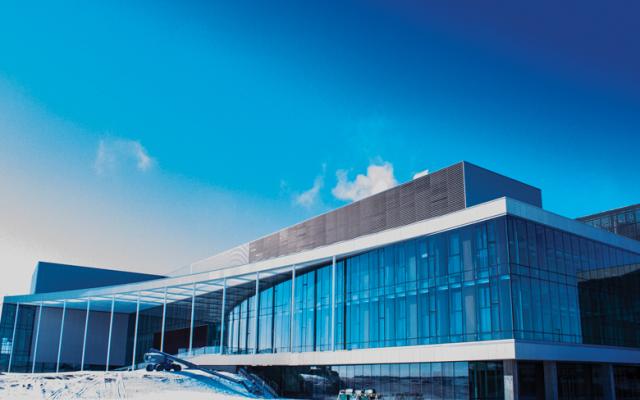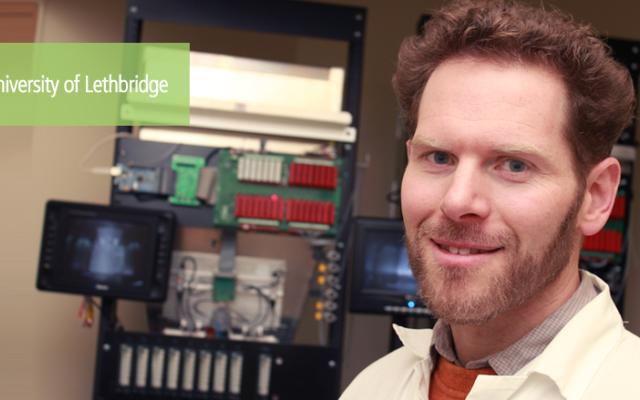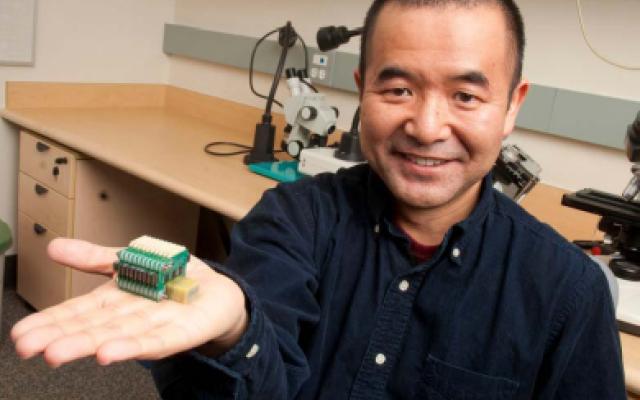The Graduate Certificate in Bioinformatics provides a solid foundation in bioinformatics' theories, methods, and applications. Students will learn to use various techniques and computational tools to process, analyze, interpret, and communicate complex biological data, which are applicable to a variety of scientific fields, including human genetics and precision medicine, livestock and plant genomics, and microbiology. Through this professional graduate certificate, students can enhance their career, among others, in biomedical research, drug development and smart agriculture.
Frequently Asked Questions (FAQs)
The genetic information of all organisms (humans, animals, plants, microorganisms) is encoded mainly in the biochemical sequence of the four DNA bases (A, T, C, G). It forms their genome, which in the case of humans is 3-billion-DNA-base-long. To store the extraordinary amount of genomic information in non-digital media, we would need more than 1200 hefty telephone books (1000 pages each). Until recently, more than a day would have been required to "read" just a single page of these books with devices called sequencers, which were the size of a large refrigerator. However, today, a new generation of sequencers (often of the size of a cell phone) can read all these pages in a matter of hours. For the first time, we can resolve fundamental questions about life and use this information for applications in almost all areas of modern life and economy. Bioinformatics is the scientific field that handles this incredible amount of data produced through these new disruptive technologies.
Bioinformatics applications include but are not limited to fields such as:
Health Care | personalized genomics, precision medicine, molecular diagnostics, genetic testing and screening, genomic epidemiology, antimicrobial resistance surveyance and monitoring
Wellness | population genetics, ancestry services, wellness genomics, nutrigenomics
Agriculture | smart agriculture, antibiotic resistance and one health, crop health and sustainability, livestock sustainability, enhancement and health
Biotech Research and Development | novel drug development, testing and diagnostic monitoring services
Environment and Sustainability | wastewater and water system monitoring, toxicology, impact and sustainability tracking and tracing
Experience and comfort in bioinformatic analysis are an asset and valuable skillset in all biological sciences and a distinguishing factor by many employers seeking new hires in these fields.
This graduate certificate program is geared towards either life scientists with no/limited computational experience or computer scientists with no biology background and no working experience on biological data. You will expand upon your undergraduate degree and acquire skills in the field of bioinformatics or transition seamlessly to more advanced graduate studies in bioinformatics or a relevant industry career.
The Graduate Certificate in Bioinformatics is a part-time program consisting of four courses (12.0 credit hours). Students will be able to complete this program in six months (January-June). The core classes of this certificate take place in the evening, enabling professionals to attend in parallel with their other activities.
Among the individuals who could benefit by attending this program are:
- A graduate with an undergraduate degree in life sciences, natural sciences, computer sciences, and engineering or related fields who wants to get highly specialized skills in bioinformatics applications that will provide them with accelerated access to careers in bioinformatics.
- A graduate with an undergraduate degree in life sciences, natural sciences, computer sciences, and engineering or related fields who wants to pursue a career in life sciences through a Master of Science but lacks the basic background for such a transition.
- A graduate with an undergraduate degree in life sciences, natural sciences, computer sciences, and engineering or related fields who wants to improve their grades while attending a new program.
- A graduate with an undergraduate degree in life sciences, natural sciences, computer sciences, and engineering or related fields who prefers a course-based graduate program compared to a research-intensive one.
- A graduate with an undergraduate degree in life sciences, natural sciences, computer sciences, and engineering or related fields who prefers a course-based graduate program as a transition stage before enrolling in an MSc or PhD program.
- MD, MSc or PhD graduates who want to specialize in the field of bioinformatics and genome sciences (all applicants for this program need a bachelor's degree).
- Professionals (with at least a bachelor's degree) who want to enhance their skills and learn new applications in their current job or business.
- Graduates or professionals (with at least a bachelor's degree) interested in re-training to a new field and career change.
- Government employees (with at least a bachelor's degree) who need an introduction to new technologies.
- An international graduate who meets all admission requirements who wants to enter the Canadian academic system through further specialization in the field.
Students may complete the program in person or by remote synchronous attendance.
- In a fast-growing knowledge economy, a graduate certificate in bioinformatics provides the flexibility and opportunity for accelerated access to the job market in this field that is currently seeking highly qualified and skilled personnel. Such a program also offers an opportunity for professionals to specialize or to re-train in a new field.

- A graduate certificate in bioinformatics fills an unmet need for immediate bridge training after an undergraduate degree or re-training for those individuals who meet the admission requirements, who may wish to acquire further specialization before a career change, providing a more streamlined training experience compared to traditional two- or five-year graduate degree programs.
- Not only are applicants with skills in bioinformatics more likely to be considered for a position that would benefit from these skills but compiled remuneration data indicates the average annual salary of a Bioinformatician is 8.6% higher for an applicant with bioinformatics skills compared to one with skills in general biology (glassdoor.com, payscale.com, talent.com).
The application of genomics technologies, of which bioinformatics constitutes the core, helps solve real-world problems in multiple sectors, including health services, agriculture, environment, forestry, and mining, providing new insights into management and sustainable resource strategies in these industries.
After graduating, you could work as a bioinformatician:
- In an academic/research institution
- In a genetic testing lab
- In a microbiology lab
- In a Biotech / Startup
- In R&D in the industrial sector
- In Government of Canada and Provincial Research Centres
Lethbridge is a leader in the bioinformatics field:
- It is the home of the Southern Alberta Genome Sciences (SAGSC), an institute dedicated to research and training in genome sciences, bioinformatics and related applications. Participants in the program will have the opportunity to acquire work-integrated learning in one of its labs and participate in the numerous extra-curricular workshops and training activities it offers. The program instructors include the director and the centre's scientific officer, both recruited from Harvard University with additional industry experience in US genome interpretation companies. SAGSC and the University of Lethbridge are the leading nodes of the Bioinformatics Network Alberta (BioNet Alberta). This pan-provincial network brings together scientists and professionals in bioinformatics from the Universities of Lethbridge, Alberta and Calgary, and local government entities in Agriculture and Agri-Food Canada and the Canadian Food Inspection Agency. Participants in the program will have the opportunity to participate in the network's numerous extra-curricular training activities, including the BioNet annual bioinformatics conference. BioNet's program manager is located at the University of Lethbridge and will facilitate these interactions.
- It has a developed Bioinformatics Core facility that offers fee-for-service bioinformatics services to academia, industry, and government, where program participants will have opportunities for work-integrated learning experiences. Real-world experience in a functioning bioinformatics core facility is a significant asset and differentiator to employers considering new hires in bioinformatics fields.
- It is home to the Canadian Centre for Behavioural Neuroscience (CCBN), a world-renowned centre with faculty members who have diverse interests in computational neuroscience and AI applications that have led to an exponentially growing amount of data that requires computational interpretation not only for analysis but also for storage and characterization purposes, tasks ideally suited for bioinformaticians and those with experience in computational manipulation of scientific outputs. Participants in the program will have the opportunity to select a course in computational neuroscience and become involved with the CCBN to expand knowledge into these areas of research further and gain the required skills to find employment in these areas after completion.
Program Events & Highlights

Boost your resume with Bioinformatics
There are plenty of ways to improve your job prospects – the trick is finding a program that fits your schedule, matches your areas of interest and that’s most attractive to potential employers. Melissa Ota (BSc Co-op '21, GC '22) discovered all of these in the Graduate Certificate in Bioinformatics at the University of Lethbridge.
“I decided to take the certificate because I thought it would be a great way to diversify my resume in a short amount of time,” says Ota, who graduated from the certificate program in June as one of the University of Lethbridge's inaugural bioinformatics alumni. “I’m interested in furthering my education by applying to some professional degree programs and this certificate has given me unique experience that helps me stand out from other applicants,” Ota says.
It’s also strengthened her skills that are highly transferable, such as programming and research skills, as well as her ability to work effectively in a team. Ota didn’t know that bioinformatics was such a collaborative and interdisciplinary field, and she was pleasantly surprised to work on projects with people from all different educational backgrounds.

Harnessing Biological Information in a Data-Driven World
It’s no secret the world is creating an unprecedented amount of data.
In fact, it’s estimated that in 2020, we created 1.7 MB of data every second. But producing endless data won’t do us much good unless we analyze it in an intelligent and meaningful way, especially when it comes to biological, genetic and health-related information.
Enter bioinformatics. From personalizing cancer treatments and detecting COVID variants, to making agriculture more sustainable and improving forest productivity, bioinformatics plays a vital role.
Bioinformatics, the study of large amounts of biological information, is a discipline that prides itself on problem solving. And the application of genomics technologies, of which bioinformatics constitutes the core, helps solve real-world problems in multiple sectors, including health and agriculture, the two focus areas for the Graduate Certificate of Bioinformatics.

Bioinformatics: Unravelling Complex Biological Data
If you took 150 hefty, old-school telephone books and piled them up into a very tall stack, you might just have enough room to store our genomic information in a non-digital format.
Then you’d want to get really comfortable, as it would take you more than a day to read only a single page of one of these books.
“Our genetic information is encoded mainly in the biochemical sequence of DNA and forms our 3-billion-base-long genome,” says Dr. Athanasios Zovoilis, a professor in the Department of Chemistry & Biochemistry and a member of the Southern Alberta Genome Sciences Centre, the Canadian Centre for Behavioural Neuroscience and the Alberta RNA Research and Training Institute at the University of Lethbridge.

The Field of Science that's Hot and Getting Hotter
Looking for the hot new field of science that combines various expertise into one elegant discipline? Bioinformatics may just be the perfect fit.
According to BioSpace, careers in bioinformatics are hot and getting even hotter, thanks to the colossal amount of data being generated daily – and the need to expertly analyze and interpret that data.
“For example, today genomics helps us produce better and safer food with less environmental impact, boost forest productivity, mitigate climate change impact on agriculture, fisheries and forestry, and monitor invasive species. This translates into a surge of job opportunities for bioinformaticians both in urban and rural regions across all Canada.”
In fact, that growth is so rapid, a recent report predicts the global bioinformatics industry will reach USD $21.8 billion in the next five years.

Bioinformatics at the University of Lethbridge
The University of Lethbridge has a vibrant community in bioinformatics, genome sciences and computational neuroscience as parts of two research centres, the Southern Alberta Genome Sciences (SAGSC), and the Canadian Centre for Behavioural Neuroscience (CCBN) as well as a bioinformatics core facility. Various labs in these centres and across the campus offer opportunities for independent studies and gaining work-related experience in these fields. The U of L's affiliation with BioNet Alberta provides a wide range of additional training opportunities in the form of workshops, symposia, speaker series and other types of scientific meetings.
Meet the Instructors

Aaron Gruber
Faculty
Department of Neuroscience (CCBN)
Office: SA8242
Phone: (403) 394-3934
Email: aaron.gruber@uleth.ca

Artur Luczak
Faculty
Department of Neuroscience (CCBN)
Office: SA8240
Phone: (403) 394-3974
Email: luczak@uleth.ca

Masami Tatsuno
Faculty & Assoc Chair
Department of Neuroscience (CCBN)
Office: SA8234
Phone: (403) 394-3998
Email: tatsuno@uleth.ca